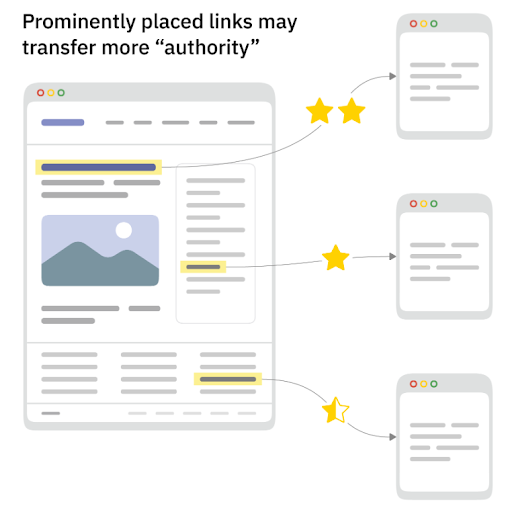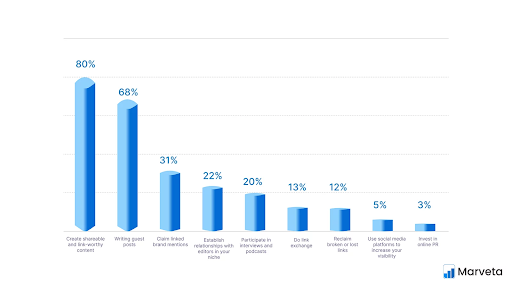With the continually evolving Google algorithms and numerous ranking factors, it becomes difficult to focus your SEO efforts on just a few key strategies.
But if you ask any SEO expert, they’ll tell you that link building is and will remain one of the most important ones.
In fact, according to a recent survey by Marveta, 65% of SEO professionals believe that link-building has a huge impact on SEO.

But what is link building, why should you care about it, and how should you go about it?
In this link building guide, you’ll find the answers to these questions and more. We’ll discuss everything you need to know to run successful link building campaigns.
Let’s get started.
Table of Contents
ToggleWhat is link building in SEO?
Link building refers to the SEO practice of building backlinks to a website by placing hyperlinks on relevant anchor texts.
The link is an external link for the website on which it is placed. Whereas it is a backlink for the website it directs visitors to.

The goal is to enhance the search visibility of the website that these backlinks direct to.
Don’t confuse it with internal linking, which involves adding links to similar resources on the same website. While internal linking is also good for SEO, the focus of this post will be external link building, starting with its SEO benefits.
Why is link building important for SEO?
Building backlinks is one of the most important off-page SEO tactics because backlinks are among the top ranking factors for Google.
According to Backlinko, the top-ranking pages on Google SERP (search engine results pages) tend to have a greater number of referring domains than those who don’t.

But why do backlinks affect rankings?
The simple reason is this:
If an authoritative website links to yours, it’s giving its vote of confidence in your website and its content. This acts as a trust signal for Google, enhancing its trust in your website.
And as Google prefers to show high-quality content on top, it gives preference to websites it trusts.
Remember, only high-quality backlinks can help improve your search rankings and not all links are good links. Let’s discuss what makes a good backlink in the next section.
How to build links for your website: 4 ways to do so
Links can be built in four different ways — adding, asking, buying, and earning.
Let’s discuss what each of these entails.
- Add: You can add your website’s links in the comments section of a blog or in the answers you write for online forums like Quora. Getting your website listed on directories along with a backlink, is another way to manually add backlinks to your website.
- Ask: This is one of the most popular ways of building links. It involves simply asking third-party website editors to add links to relevant resources on your website in their articles. Guest blogging, skyscraper technique, broken link building, etc, are some tactics that fall under this category.
- Buy: This is the practice of buying links in exchange for money. It’s not recommended and can do more harm than good to your SEO in the long run.
- Earn: When someone finds your content or resource useful and links to it, without you asking them, it’s called earning a link. Links to original research, free tools, infographics, and other valuable resources are often earned links.

Pro tip: Except for buying links, you can use the rest three ways of link building. However, adding links should be done sparingly and in an ethical manner.
What are the characteristics of high-quality links?
When done right, link building can help boost your domain authority, SERP rankings, and search visibility. But you need to build high-quality backlinks to achieve these results.
Let’s take a look at the key characteristics of a high-quality backlink.
- The authority of referring domains: Links from websites with a high domain rating are more beneficial than those from less authoritative sites.
- PageRank: Even if you get a link from an authoritative website, a link from a high-authority page is preferred. Though it’s difficult to measure PageRank, pages that get a lot of high-quality links pointing to them are more authoritative.
- Anchor text: Backlinks placed on contextually relevant anchor texts are better than those placed on unrelated or generic terms, such as “click here.”
- Topical relevance: Links that come from a site that is within your niche are more relevant. Even between two similar sites, links should be directed only to similar or related content and resources. Here’s a visual explanation of the concept:

- Content freshness: Backlinks from new and updated pages carry more weight than those from old and outdated ones.
- Link placement: Links placed at the top of a page are more valuable than those placed at the bottom of the page. Here’s a visual illustration of this concept by Ahrefs:

- Editorial links: Links that are earned are more valuable than links that are placed by you, probably as a result of your outreach activities. Editorial links suggest that your content is worth linking to.
- Dofollow links: Since nofollow links don’t pass any page authority, the focus of your link building efforts should be on building dofollow links.
The most effective link building tactics to use in 2023
Now that you understand what kind of links you should build, let’s discuss the strategies you can use to build these high-quality backlinks.
According to the previously-cited Marveta survey, here are the top link-building tactics preferred by marketers.

Here’s the gist:
- The best way to build high-quality links is to create link-worthy content such as studies, reports, and infographics. This will help you earn editorial links.
- Writing guest posts for authoritative websites in your niche is also a great strategy for link building, and is preferred by most marketers.
- If you want a low-effort link-building tactic that drives quick results, simply ask people who’ve mentioned you on their website to add a link to that mention.
- Building good professional relationships with editors in your niche can provide a steady source of backlinks for your website.
- Participating in interviews and podcasts is a creative way of earning high-quality backlinks.
Along with these, some other link-building tactics include broken link building, link reclamation, link exchange, social media link building, etc.
The dos and don’ts of link building
You can do link building using both white hat and black hat tactics. While the latter may deliver quick results, it can also hurt your reputation and cause Google penalties.
When it comes to link building, it’s better to think of it as a long-term game and focus on using ethical ways to build high-value links to your website.
Follow these dos and don’ts of link building to stay on the right track.
Dos of link building |
Don’ts of link building |
| Do focus on organic ways of building links, such as nurturing relationships with editors of websites in your niche. | Don’t buy links or partake in link schemes with a network of websites. |
| Do use a mix of exact match, phrase match, and branded anchor texts while building backlinks. | Don’t overuse exact match anchor texts or use irrelevant anchor texts when linking to resources on your website. |
| Do link to and get backlinks from authoritative and reputable websites. | Don’t allow links from spammy websites or focus on quantity rather than quality. |
| Do go for quick wins, such as unlinked mentions, as long as they’re ethical. | Don’t use black hat tactics like cloaking and using hidden text links. |
Final thoughts
You must have clarity on what link building is and why it’s important for you to succeed in your SEO efforts.
Use this post as your guide to understanding the essentials of link building and getting high-quality backlinks for your website. Using the right link building tools and strategies, you can boost your website’s overall SEO performance.
So, get right to it and start your link building campaign right away. All the best!
FAQs
Which tools should I use for link building?
To find backlink opportunities or analyze your backlink profile, you can use SEO tools like Semrush and Ahrefs. For your link building outreach process, tools like Respona and Pitchbox are quite useful.
You should also join platforms like HARO (Help a Reporter Out), Quora, and Reddit to answer questions and insert links to your website within those answers.
What is HARO link building?
HARO is a platform where reporters and writers come to seek expert advice on specific topics. They post questions that experts in various fields can answer. HARO link building refers to the practice of answering questions on the platform and adding backlinks to those answers.
Do I need to outsource link building?
You can invest in professional link-building services if you want quick and assured results. While this is a good short-term strategy, it’s too expensive to outsource your link building requirements in the long term.
As it is an ongoing process, you need to learn how to build links organically and use a mix of link building tactics to get the best results.








